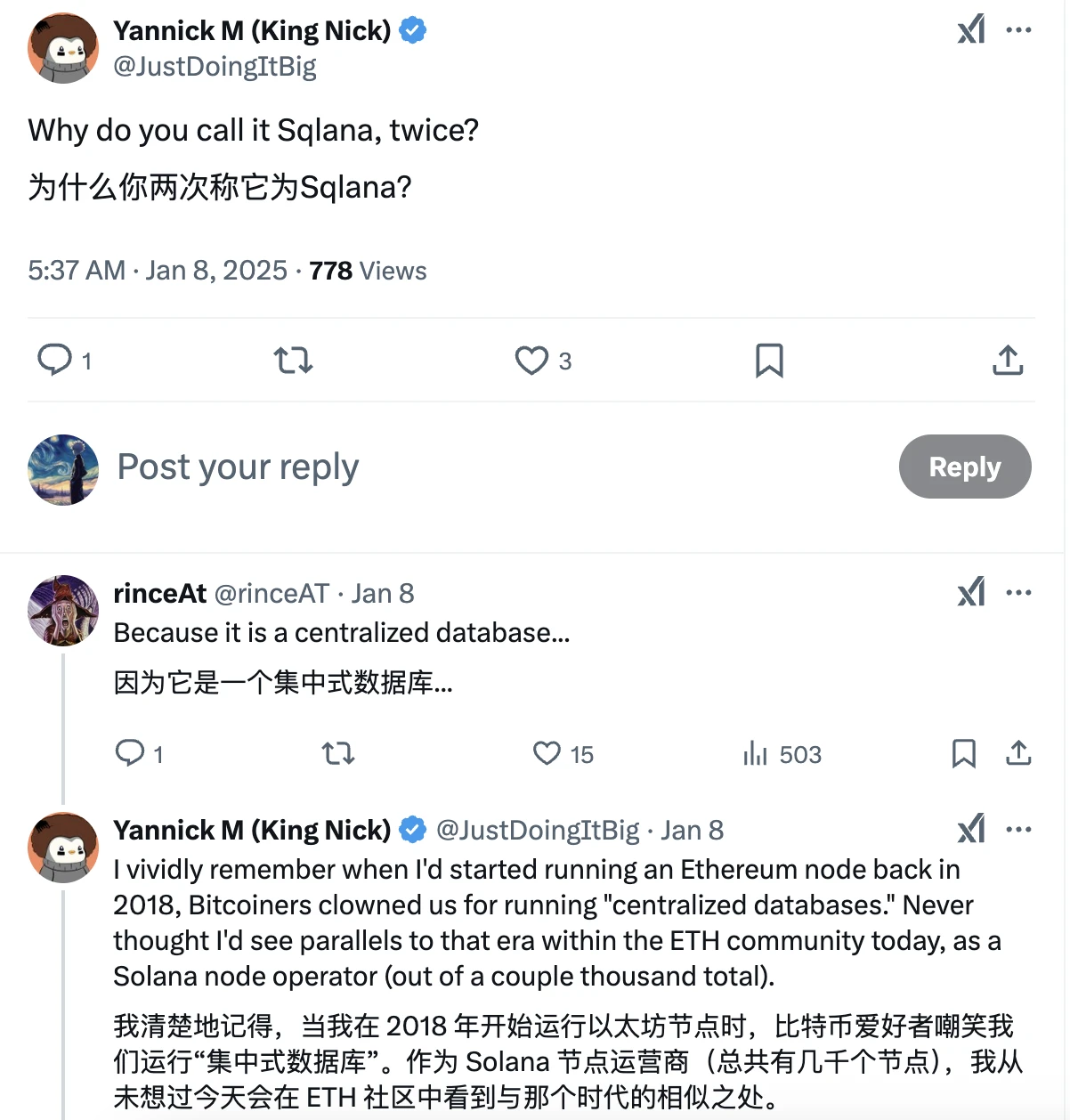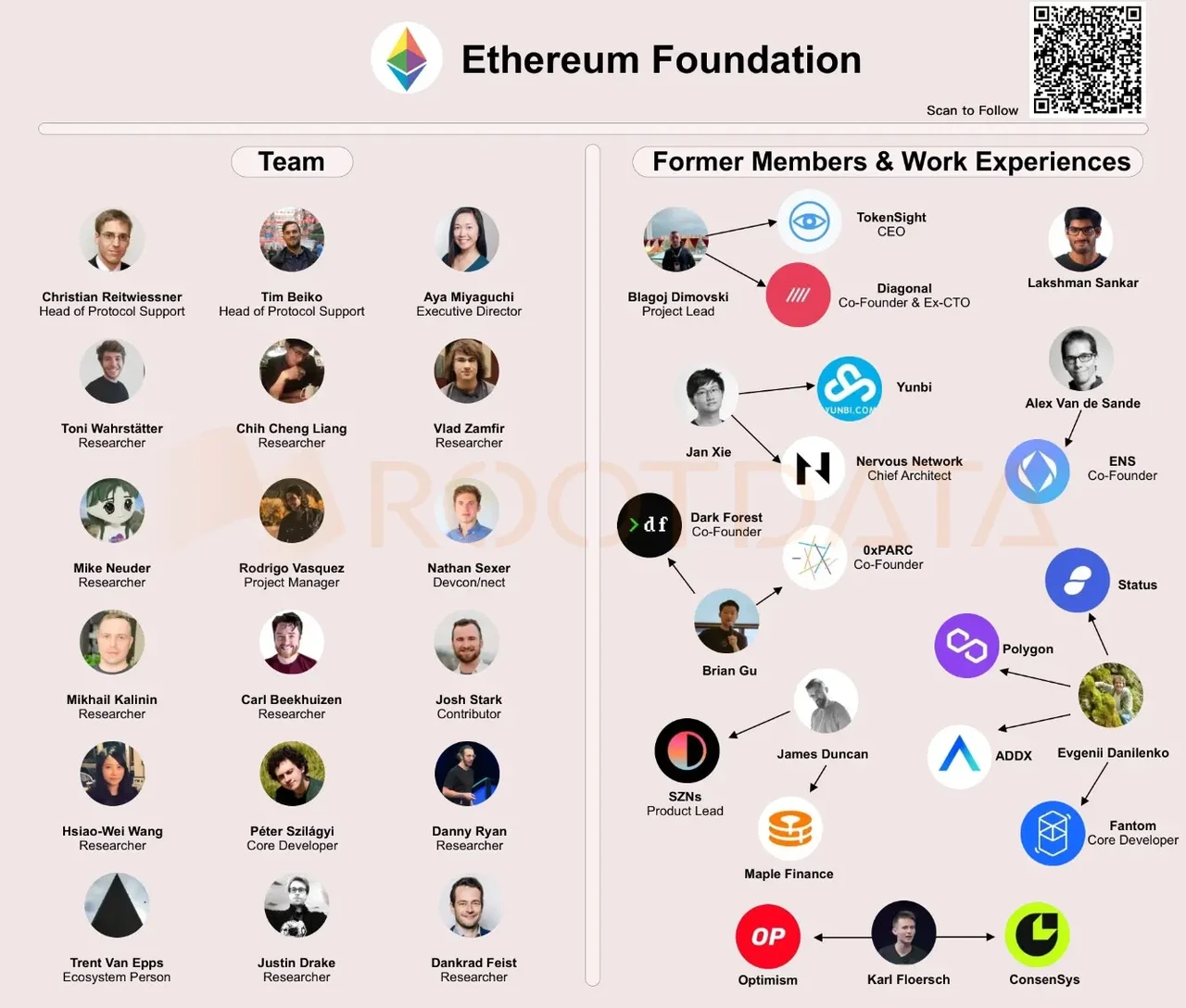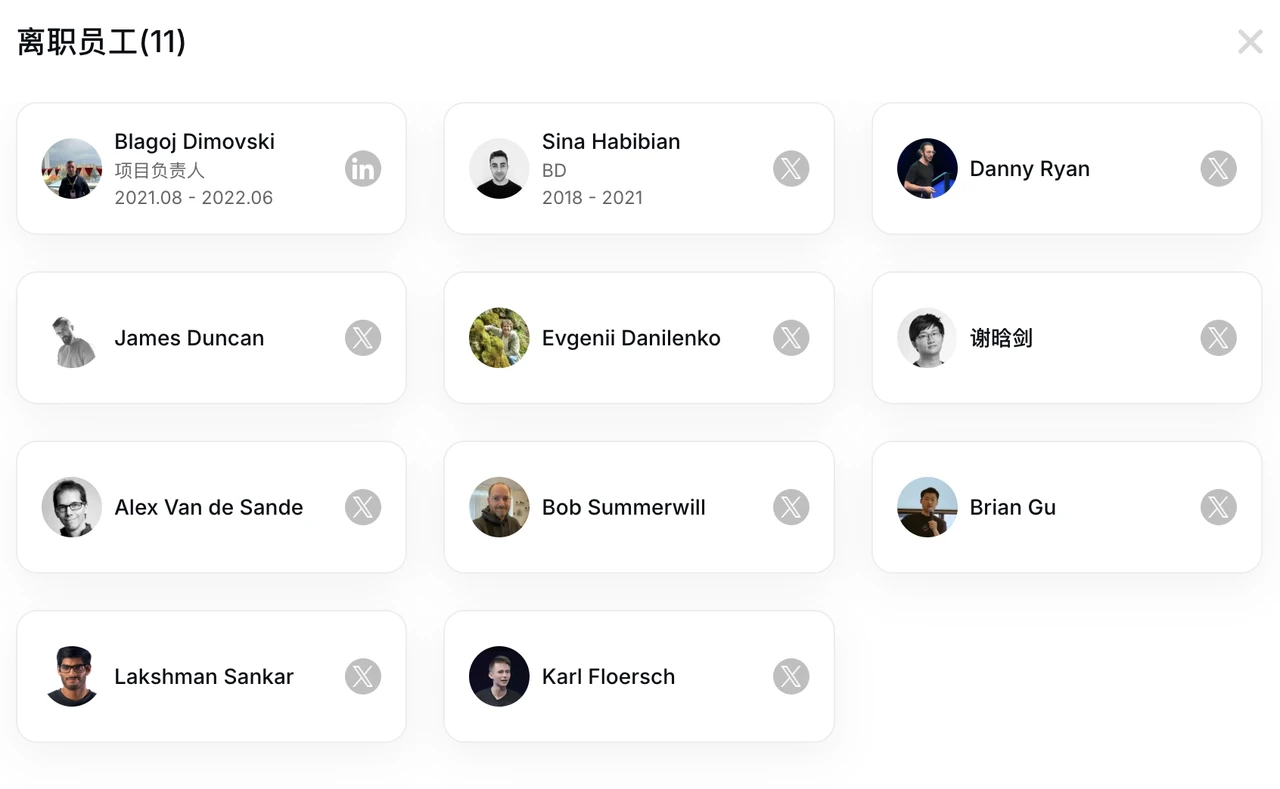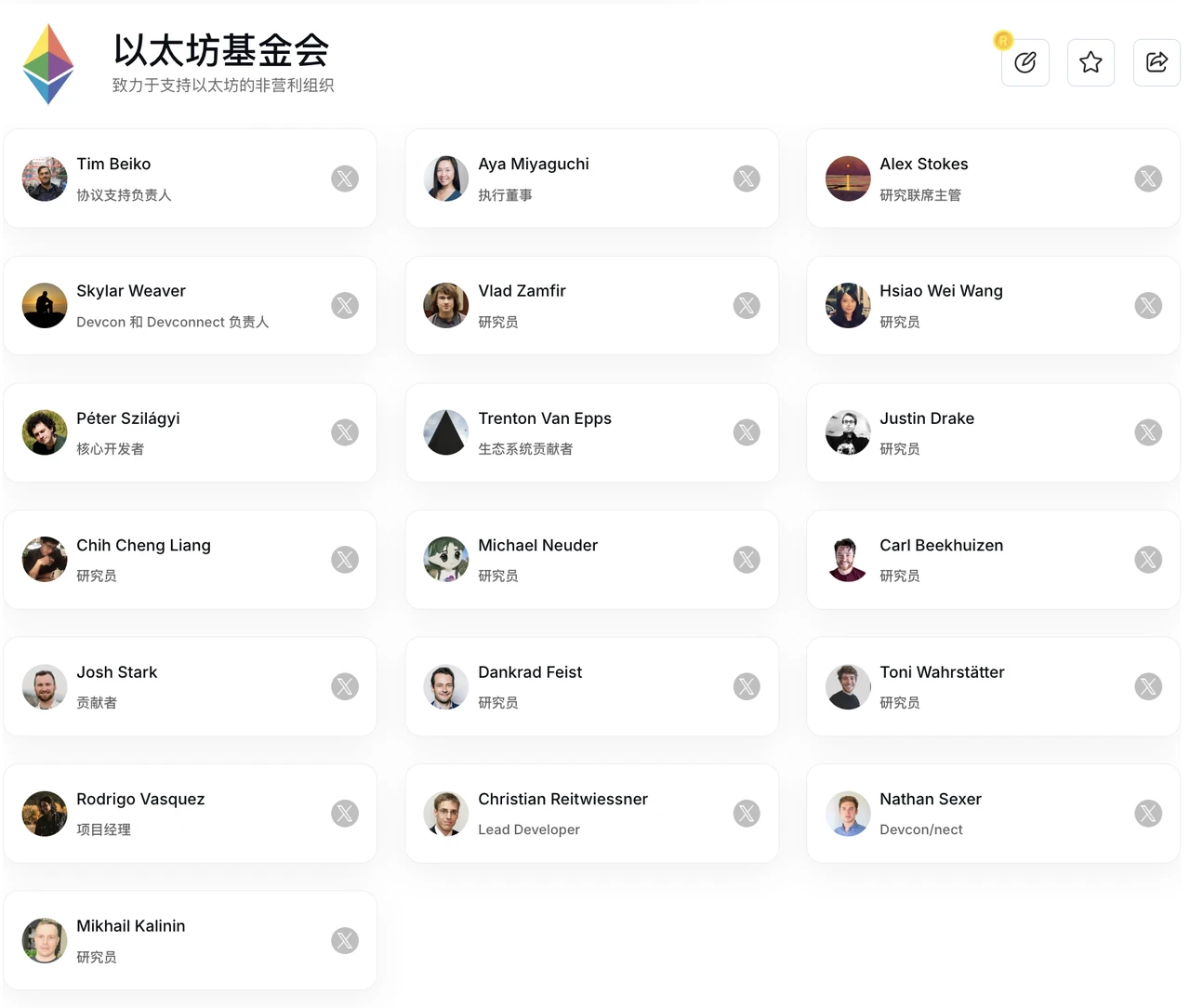Vitalik launched the first shot of "reform". Where does the Ethereum Foundation go?

Reprinted from panewslab
01/26/2025·3MAuthor | Wenser, Odaily Planet Daily
On January 18, Vitalik, the founder of Ethereum, issued an article stating that "large-scale changes are being made to the leadership structure of the Ethereum Foundation (hereinafter referred to as EF)."
As soon as the news came out, it stirred up a lot of waves: some people thought that it had finally "returned from its lost ways"; some said that "EF should have been rectified long ago, the leadership of this group of corpses"; others thought that "because of the rapid development of Solana's ecology, Ethereum The sense of ecological crisis has never been stronger, and he is anxious."
To be sure, Vitalik is not the only one who is anxious.
On the evening of January 22, Konstantin Lomashuk, the founder behind the Lido project, an important infrastructure in the Ethereum ecosystem, first retweeted a tweet about the "Second Foundation" and later clarified that it was not the second EF, but just an ordinary tweet. In September last year, in response to the sluggish Ethereum ecosystem, we wrote in "Ethereum is "sick", are these three medicines symptomatic? "The reference plan is given in the article, and now it seems that it is exactly what we expected.
But a more important question emerged: How to revive the glory of the Ethereum ecosystem? Will EF reform be the dawn of revival? With such questions, Odaily Planet Daily will conduct a systematic analysis of the follow-up possibilities of EF changes and the follow-up trends of the Ethereum ecosystem in this article for readers' reference.
Pride and Prejudice: The Light and Dark Side of the Ethereum Foundation
On January 18, Vitalik Buterin, the spiritual leader of the Ethereum ecosystem and co-founder of Ethereum, issued an article saying that large-scale changes in the leadership structure of EF have been going on for nearly a year. In other words, throughout 2024, the EF leadership headed by Vitalik has actually begun a "self-revolution", but at present, the phased conclusion we can give is that this self-revolution has had little effect for the time being.
The signal released by the goal of change: focus on ecology and have no
intention to involve politics and ideology
In view of this, Vitalik also mentioned that the main goals of this change are:
- Improve the technical expertise of EF leadership;
- Improve two-way communication and connection between EF leadership and new and existing participants in the ecosystem. Our responsibility is to support users (individuals and institutions), application developers, wallets, L2;
- Introducing new blood to improve execution capabilities and speed;
- More actively support application developers to ensure that important values and inalienable rights (especially privacy, open source, censorship resistance) are realistic and available to users, including at the application layer;
- Continued increased use of decentralization and privacy technology and the Ethereum chain, including for payments and money management.
Furthermore, he emphasized that the goals of EF change do not include:
- Perform a certain ideological/atmosphere change (it is worth mentioning that what he mentioned here is: from the feminine wef soyboy mentality to the bronze age mentality, Odaily Planet Daily Note: That is, from a soft and feminine perspective Thinking from a male perspective that focuses too much on practical benefits and success);
- Actively lobbying regulators and powerful politicians (especially in the United States, where the focus is more on the big powers) and risking damaging Ethereum’s status as a global neutral platform;
- Become an arena for vested interests;
- Become a highly centralized organization and even become the "protagonist" of Ethereum.
Finally, he noted: "These things are not what EF does, and that won't change. People looking for a different vision are welcome to start their own organizations."
After careful consideration, the goals mentioned by Vitalik roughly mean as follows: adhere to technical thinking; adhere to the concept of decentralization; unswervingly implement the L2 development route; but the specific measures are not yet clear. It can be seen that Vitalik's reform of EF is still superficial, and the results are self-evident.
EF’s most controversial focus: transparency, workload, and speed of
crashing the market
Going back to the root of EF’s current predicament, the author believes that it mainly comes from the following three aspects:
First, there is a lack of information transparency. This is not only reflected in the vagueness of the foundation’s related fund expenditures, but also related to the delay in public announcements, which is in sharp contrast to the agility and efficiency of the Solana ecosystem. In December last year, EF officially released a funding project update report for the third quarter of 2024. The total funding during the period reached US$12,848,780.33, covering community education, consensus layer, cryptography and zero-knowledge proof, developer experience and tools, execution layer, L2, and protocols. areas of growth and support. Among them, community education projects account for the highest proportion, including Blockchain Summer Bootcamp, BlockHack, Building Builders and other activities. In addition, the foundation continues to support the development of consensus layer clients such as Lighthouse, Nimbus, and Grandine, as well as development tools such as Web3.js and OpenZeppelin account abstract contracts. It is worth mentioning that, as far as I know personally, EF’s funding has not been audited by an independent third party. (If you have relevant examples, please feel free to correct me)
At the same time, due to limitations such as region and time, the decision-making power of EF funding is only in the hands of a few people, which should be expected. This has also resulted in the inability to obtain the work of some community members who have contributed to ecological development. due support. In early January, Evan Van Ness, founder of Week in Ethereum News (WiE), wrote: “Due to a conversation with EF leadership at the beginning of this year, I announced that this newsletter will terminate operations because of communication. Indicating that they see no value in continuing to operate WiE, WiE received only minimal financial support from EF for the remainder of 2024, although this support was mostly symbolic. The leadership’s choice to cut off this meager support is a clear sign that WiE will end immediately.”
Secondly, proof of work is missing. For EF's work, the outside world cannot see effective proof of work. For the blockchain world, although the Ethereum ecosystem has shifted to a POS mechanism, at the organizational level, POW is still the most direct and relatively efficient operating mode. In this regard, EF is a well-deserved negative teaching material. "What you did and others knowing what you did" are two completely different things.
In addition, this result also stems from the impact of organizational structure. This is also one of the hotly discussed topics in the encryption field recently. For example, encryption KOL @0xAllending pointed out, “Solana One of the important reasons for being able to stand out in the blockchain network competition is to challenge the market position of ETH with the concept and intensity of corporate management." In contrast, the Ethereum ecosystem, especially EF, still remains at the "decentralization Community autonomy, senior leaders + mid-level researchers/developers + ordinary community members/holders" is a community organizational form with a similar structure. Under the banner of "World Computer", we are dreaming of Mass Adoption. This It's nothing more than a fool's dream.
Finally, the smashing speed is extremely fast. This is the point that countless people criticize EF the most. It’s not that there is no similar phenomenon of selling ecological tokens in other ecosystems, but that EF’s selling is always like a phased peak signal, and often no one is there at this time. Mentioned "Belief in Ethereum and firmly HODL ETH". Previously, according to Lookonchain monitoring, the price of ETH has fallen by approximately 17% since EF sold 100 ETH on December 17. EF sold 4,466 ETH (approximately $12.6 million) in 32 transactions in 2024, 15 of which were sold at the highest point in the short term.

EF has been \"Top Signal\" for quite some time
It is worth mentioning that previous Token Terminal data showed that Ethereum L1 network revenue has dropped sharply, falling 99% since March 2024. On March 5, the network revenue of the Ethereum Layer 1 network reached a peak of more than 35 million U.S. dollars; on September 2, the daily revenue had dropped to about 200,000 U.S. dollars, hitting the lowest daily revenue point of the year. At the time, cryptocurrency analyst Kun warned that if this trend continued, L2 networks could become dominant and potentially abandon Ethereum’s mainnet, especially for consumer applications. Although this revenue eventually returned to pre-Dencun upgrade levels by the end of 2024, the decline in Ethereum mainnet protocol revenue is beginning to show.
If we look closely at the reasons behind it, perhaps Pride and Prejudice bears the brunt.
Reason behind: Pride is the original sin, prejudice is the shackles
EF researcher Justin Drake said in early December last year that Solana’s golden age was coming to an end and would not pose a threat to Ethereum. Despite Solana’s momentum, Drake said Ethereum is focused on long-term gains (sound familiar?). "Solana is in its prime right now, but I think this will be the end of Solana's golden age because all of Solana's competitive advantages in latency and throughput will be gone because fundamental differences in architecture make it non-scalable" . Currently Ethereum developers rely heavily on Layer 2 to provide faster and lower transaction fees. Drake said: “I think Ethereum L1 is competing with the Bitcoin ecosystem, and the L2 network is competing with Solana. So competing with Solana is not even within the scope of Ethereum L1’s remit, we should compete on security and health. So "If there is any competition for Solana, it needs to come from applications and L2 networks."
Coincidentally, in a tweet by Evan Van Ness, the founder of Ethereum News Weekly, in response to the newsletter's imminent closure, he called "Solana" "Sqlana", which seemed to imply that Solana is a centralized database. Someone also mentioned this in the comment area. a little. Senior node operator @JustDoingItBig expressed confusion about this: In 2018, Bitcoin believers laughed at Ethereum nodes for running "centralized databases"; but now, Ethereum fans behave the same way.

I can only say that history always rhymes
As for the views on EF, according to the author's personal observation, most Ethereum community members still support it positively, and those who express dissatisfaction are mostly ETH traders or market retail investors. Among them, perhaps the views of community member fishbiscuit (@not_qz) can represent a considerable number of "loyal EF fans". He has previously issued a post in response to the community's many questions about the foundation, clarifying:
- Social media activity: Similar to the Solana Foundation, EF used to mainly repost content, but has recently begun to post updates more actively;
- On-chain use: The foundation has pledged 42,000 ETH to support client development, while funding on-chain projects such as EIP-1559 NFT and Beacon Book, and distributing funds through the main network and L2. Events like Devcon also support crypto payments;
- ETH sell-off: In response to the accusation of the foundation selling ETH, he pointed out that the foundation's move was to adopt a variety of strategies to balance market pressure, and called on the community to avoid double standards, while emphasizing the regulatory challenges faced by the foundation. Call on the community to view the foundation’s contributions rationally and encourage more constructive discussions.
I have to say that despite the many problems with EF, the community's attitude is still extremely tolerant.
To some extent, it has once again verified the fact that the butt determines the head. Now that we have boarded the Ethereum ship, we can only work together through thick and thin.
Focus of conflict: Vitalik under pressure, executive director Aya under
attack and the fragmented Ethereum community
As time goes by, many contradictions related to this EF change have gradually surfaced, with the spearhead pointing directly at Ethereum founder Vitalik, EF executive director Aya, and the Ethereum community, which currently has serious fragmentation problems.
The dilemma of the spiritual leader of Ethereum: proactive change vs.
past friendship
Since the news of EF's changes was released on the 18th, Vitalik has undoubtedly been in the eye of the storm under multiple pressures: on the one hand, ETH's price performance is poor and ETH's ecological development is out of a period of rapid growth. This situation needs to be changed urgently; on the other hand, EF Core The team is also facing a period of transformation. With "EF researchers Justin Drake and Dankrad Feist joining Eigenlayer, and core researcher Danny Ryan leaving EF last year" as landmark events, the past "revolutionary friendship" is facing a test.
Recently, the news that Eric Conner, an early core developer of Ethereum, announced his withdrawal from the Ethereum community has also triggered heated discussions (although, according to an Ethereum community member, this is not the first time he has made such a "farewell"), but Different from the past, he also said that as Vitalik Buterin gradually retreats behind the scenes, EF's opacity and sense of disconnection from the community are getting stronger and stronger. He pointed out that EF currently exhibits an "anti-winning and competitive mentality", which has led many community members to question whether to stay (which coincides with the non-goals mentioned in Vitalik's previous "Reform Manifesto").
According to information on the Rootdata website, there are currently 11 EF employees who have resigned, including many early BD personnel and Danny Ryan, who led the POS transition. According to a chart in May last year, most of the EF employees who resigned have chosen to start their own projects. Of course, most are still in the EVM ecosystem.

EF related member information in May 2024

EF retired employee list
At the same time, EF employees include executive director Aya, protocol support leaders including Tim Beiko, and many researchers including Justin Drake. However, the chaos in organizational management also revealed clues: Not long ago, Alex Stokes, a researcher at the Ethereum Foundation, announced that he would serve as the co-head of the EF research department with barnabe.eth. Only then did many people know for the first time that it turned out that EF’s The research department includes five teams: application research group, consensus research and development, cryptography, protocol security and RIG. This is just like when Tim Beiko released information about new recruits to the department on his X platform account before, people knew that EF's personnel flow was so rigid.

EF employees, 16 people in total
The complicated organizational management has brought about overwhelming doubts and debates, and many people are pointing their fingers at EF Executive Director Aya.
In order to protect his "comrades of many years", Vitalik, who has always been emotionally stable, had to take the initiative to "play the role of a dictator" - on January 21, he posted a message in response to community questions, saying, "I am the one who decides the new EF leadership team. One of the goals of the ongoing reforms is to provide EF with a 'right board', but until then, it's just me. If community members put pressure on EF leadership, they are creating an environment that is harmful to top talent. ”
EF Executive Director Aya’s golden mean: Opposing speculation and
advocating “Zen”
Many people may not know much about Aya, the executive director of EF, but he is a key member accompanying the development of the Ethereum ecosystem.
In Where is the Road? In the article "A Brief Analysis of the Three Abstract Problems Currently Facing the Ethereum Ecosystem", we briefly introduced it. In an interview in 2019, she mentioned: "When it comes to a blockchain full of infinite possibilities (such as Ethereum now), the path forward may include more than just Including one, two, or three voices, but there will be many voices. Our job (referring to EF) is to coordinate, but not to make actual decisions. Decisions can be made by our members, and they can certainly be made. It’s part of the decision-making process, not necessarily the whole thing.”
In a June 2023 interview with Wired magazine, Aya Again: “It doesn’t mean much if I’m the only one saying ‘no’ to the cryptocurrency speculation wave, so I try to spread the same mentality among others, like I’m a Zen Buddhist Once this mentality takes hold, people can be motivated without money, penalties, rules or laws. This is because we are thinking about how to protect the Ethereum culture after we and EF leave. 'Tao, that would be great."
In this regard, Aya and Vitalik's views are highly consistent, which has also been strongly criticized by the current market. Countless people took this opportunity to attack Aya, shouting that he should step down as soon as possible. Some people suggested that Danny Ryan should take over the position of executive director of EF, forcing Ryan to come forward to clarify: "EF executive director Aya has contributed a lot to the development of Ethereum. Please don’t slander her at will,” and reiterated: “With or without me, EF is constantly developing and getting better. I believe that the Ethereum community will be a community that develops in a respectful and rational way.”
According to LinkedIn information, Aya graduated from the Business School of Seattle State University in the United States. He previously worked in Japan at the crypto exchange Kraken and joined EF in 2018 as an executive director until now.
The fragmented Ethereum community: consensus, liquidity and attention
The third major contradiction currently faced by the Ethereum community is "fragmentation"——
First, there is the fragmentation of consensus on Ethereum’s value, role, mission, vision, short, medium and long-term goals;
Secondly, due to the fragmentation of capital liquidity in the Ethereum ecosystem caused by the L2 route, ETH loses price support;
Finally, the most important problem in the cryptocurrency industry is the fragmentation of attention. In the past, the focus of attention has gradually shifted from ETH, which has a lot of cars and people, to Solana, which has agglomeration of hot spots and obvious wealth creation effects.
In this regard, the thinking of Solana ecological leaders is undoubtedly clearer. Previously, Solana co-founder Anatoly Yakovenko once wrote: "Solana is a 'pure blockchain'. There is no DA layer, no L2, no L3, no interference. Just a Fast and Cheap Blockchain", "Multiple L2s don't make sense, if a single L2 can handle parallel execution then it can use up all the blobs. space and run every use case. ""Important underlying smart contracts only require 6, and any developer optionality that increases business risk is a negative," he also said in a debate with EF researchers. : "The biggest problem facing Ethereum is the uncertainty of DA's long-term value and the uncertainty of ETH's 'ultrasonic currency' vision." This view was also echoed by Uniswap founder Arthur Hayes.
Of course, to get out of this predicament, Ethereum will need more detailed solutions.
A three-dimensional solution to the “Ethereum dilemma”: ideas,
communication and positioning
Based on the above information, the author believes that EF’s solution to the “Ethereum dilemma” includes the following three aspects:
Let go of prejudice, let go of obsession
First of all, the concept that the EF leadership headed by Vitalik needs to revise is: no longer obsessed with the long-term "world computer" goal, but to do short-term and medium-term practical things.
Already progress on this front includes the Ethereum Foundation’s announcement of the new ETH (approximately $150 million) is used to participate in the Ethereum DeFi ecosystem.
In addition, the latest news shows that Vitalik is finally no longer obsessed with "maintaining the neutrality and detached status of the Ethereum mainnet ecology" and unilaterally injecting blood into the L2 network, but directly stated that "encouraging Layer2 By contributing a certain percentage of fees to support ETH, this can be achieved by burning part of the fees, permanently staking, and donating the proceeds to Ethereum ecosystem public goods or some other scheme." For more information, see "Under the Pressure of Public Opinion," Vitalik published an article calling L2: Go back and support ETH.
Regarding the matter of "cutting down vassals", once action is taken, I believe that the "ghost chain" problem in the EVM system will be further solved.
Listen to the community and communicate regularly
Secondly, EF can no longer bury its head in the sand like an ostrich and ignore the external environment and ignore the opinions of the community. It is worth mentioning that although Vitalik within EF does not currently have the title of "Emperor", he does have the status of "Leader". Therefore, "be close to the virtuous minister and stay away from the villain" is also a piece of advice. Don't be fooled in order to get Grants. The people who support and encourage people get confused by flattering, flattering, and pandering to them.
Less academic discussions and more regular AMAs with representative figures at the organizational level - if you are a technical person, then talk more about technology; if you are a market person, then talk more about the market; if you are just a person who makes money and makes decisions based on your head, , then invite EF as soon as possible.
Most importantly, don’t let yourself be trapped in an information cocoon.
Store of value or means of payment? this is a problem
Finally, it is the positioning of ETH and the Ethereum network. At present, due to the fragmentation problem caused by dozens of L2 networks and the excessive power of vested interest groups in ETH in the past (that is, too much profit taking), it is increasingly difficult to realize the value storage function of ETH. The narrative of simply talking about "digital silver" has become It is difficult for the market to accept it.
Payment methods are relatively more in line with market demand. In this regard, the Coinbase Wallet consumer chain talked about by Base Ecology may be one of the subsequent ecological focuses of Ethereum. Although Vitalik insists on ensuring the neutrality and decentralization of the Ethereum ecosystem, it is difficult to advance cooperation with the United States in the short term, but in the medium and long term, this is still an unavoidable problem.
In addition, as Marc Zeller, founder of the Aave contribution team Aave Chan Initiative (ACI), previously mentioned in an article, “To solve the problems of the Ethereum Foundation, it is necessary to: convert the remaining ETH of EF into a market-tested LST combination, reduce 95% of the current subsidies, especially initiatives like "Run a node in Vakuta, don't sell ETH, but use LST to lend stablecoins through Sky/Aave while reducing operating expenses" also have certain reference value.
Of course, the initiatives to "fire 80% of non-developers and current leaders" and "hand over the official account to several extremely active ETH Maxi operators" are slightly one-sided.
Finally, the ultrasound.money community once created by the Ethereum ecosystem once united many ETH Maxi, but in the end it was lost to everyone. I have to say that this is a pity. Perhaps with the changes in EF, related communities will also welcome Come to the opportunity for transformation.
Conclusion: "Don't rest on your laurels, but make new contributions."
Perhaps in the early stages of the development of the Ethereum ecosystem, EF's inaction leadership style led the rapid development of the Ethereum ecosystem. However, after experiencing several bull and bear cycles, since we have the ambition of "mass Adoption", we need new ones. The solution is not to indulge in the past glory of "Ethereum is the first encryption ecosystem", to rest on its laurels and refuse to progress.
TRUMP tokens have brought millions of people into the world of cryptocurrency. It is understandable that people come because of the wealth creation effect. After all, compared to the Web2 world that surrenders privacy and data, the eyeball effect and wealth creation boom are what the encryption world can do for people. A "Trojan horse" presented by the traditional financial world. Only when the future of crypto-economy and the world's financial system is further connected can we see the flower of cryptography in the entire universe.
By eliminating wrong answers, we will have more courage and strength to face new questions raised by the encryption world.
Countless people are walking with me on this, so I’m confident, and I hope you are too.


 chaincatcher
chaincatcher

